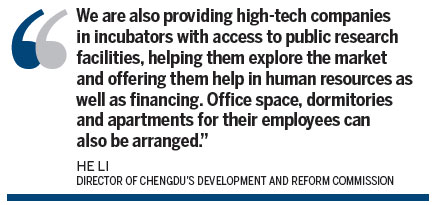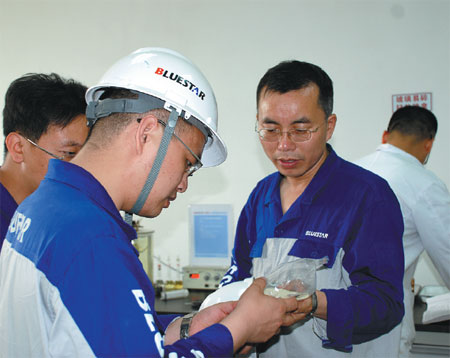Technology becoming new economic engine of Chengdu
Updated: 2014-05-16 07:14
By Zhong Nan and Li Yu in Chengdu and Lu Haoting in Beijing (China Daily)
|
|||||||||||
Transformed over two decades from China's biggest base for heavy industry in the western region, Chengdu is now thriving with a modern economy built on high-technology industries that are driving its growth and providing a window on its innovative strength.
Many of these opportunities come from China's national strategy of building the Silk Road economic belt, as well as soaring consumption power and the application of various advanced technologies.
Eager to gain higher profits from exports, Chengdu has moved toward a low-carbon, high-tech economy by curbing overcapacity and reducing the scale of heavy and energy-intensive industries on the one hand, while on the other encouraging high-tech industries to accelerate the speed of innovation and talent recruitment.
He Li, director of Chengdu's development and reform commission, said that an increasing number of domestic and international companies are building new manufacturing facilities for high-tech products, research centers and logistics hubs in Chengdu. Thus, the city is preparing to scale up efforts to improve services for strategic emerging industries and productive service sectors over the next five years.
"High-end industries, including next-generation information technology, biotechnology, precision machinery manufacturing, energy conservation and environmental protection, plus financial and business services, will further upgrade the competitiveness and innovative capacity of Chengdu and Sichuan province as a whole," He said.

The Chengdu government in February announced an overall strategy of reform, innovation, transformation and upgrading, and optimized its five strategies to push forward the city's industrial transformation and optimize the structure of high-tech industries, environmental investment, and urban and rural planning.
"We are also providing high-tech companies in incubators with access to public research facilities, helping them explore the market and offering them help in human resources as well as financing. Office space, dormitories and apartments for their employees can also be arranged," said He.
To build an efficient public service platform for more than 20,000 high-tech companies in the city, different government divisions such as the finance bureau and science and technology bureau have formulated subsidies and stimulus policies to encourage innovative activities.
Sun Ming, chairwoman of the Chengdu Federation of Industry and Commerce, said another component driving development is the central government's intention to promote urbanization and narrow the gap between the more industrial coastal cities and the underdeveloped interior and western frontier regions.
"Because the future of Chengdu's economy will be decided by innovative breakthroughs in high-tech industries, local universities and vocational colleges have been quick to adjust their curricula to follow trends in the city's changing job market and produce talented people with practical skills to fit into the teams in various small and medium-sized companies," said Sun.
"This new economic shift has already made an impressive change, helping Chengdu's high-tech companies reach more new marketplaces. They have managed well to ship their products to international and domestic destinations through well-developed international rail freight systems and air routes, as well as highways, in recent years," Sun said.
China Bluestar Chengrand Chemical Co Ltd, which makes chemical materials for civilian and military use, is one of many Chengdu companies that reflect this trend. It expects to raise production capacity of para-aramid fiber by 10,000 metric tons next year.
The company now produces 1,000 tons of the strong, heat-resistant fiber annually. It is widely used in the aerospace industry - particularly to produce ballistic-rated body armor - bicycle tires, asbestos substitutes and disaster rescue equipment.
Supported by favorable policies such as tax cuts and new land use rights offered by the Chengdu government, as well as qualified local university graduates, Bluestar Chengrand has begun research on the project's second phase. It plans to invest about 3 billion yuan ($486 million) in Chengdu to establish a production line for para-aramid and equipment to manufacture composite materials.
The expansion, with operations expected to start in 2015, will make the company the third-largest producer of para-aramid in the world after Wilmington, Delaware-based E. I. du Pont de Nemours & Co and Japan's Teijin Ltd, Wang Fengde, vice-director of Bluestar Chengrand, said.
"Para-aramid fiber is used in the production of components for automobiles, airplanes and high-speed trains, of which western China produces a lot," Wang said. "We will keep investing 10-15 percent of our annual sales into research and development every year, and we'll also consider adding several new research labs and a department in Chengdu."
The Chengdu-based company has received a high volume of orders and inquiries for the use of various new materials from traditional domestic factories in recent years, Wang said. They are interested in upgrading the technical content of their products. Interest has come from shipyards, garment factories, shoe manufacturers and tire producers in the Pearl River Delta, Yangtze River Delta and the Bohai Bay region.
Bluestar Chengrand's revenue rose to 530 million yuan in 2013, up 20 percent from the previous year. It has over 500 employees, including 200 scientists and researchers in different departments. It has sold para-aramid to countries including Germany, France, Turkey, Spain and Italy last year, at relatively competitive prices.
Contact the writers at zhongnan@chinadaily.com.cn, liyu@chinadaily.com.cn and luhaoting@chinadaily.com.cn
|
Wang Fengde (second from right), vice-director of China Bluestar Chengrand Chemical Co Ltd, tests products together with researchers. Provided to China Daily |
Hot Topics
moon rover air defense identification zone CPC and reform China and Japan air pollution Cameron in China
Editor's Picks

|

|

|

|

|

|







